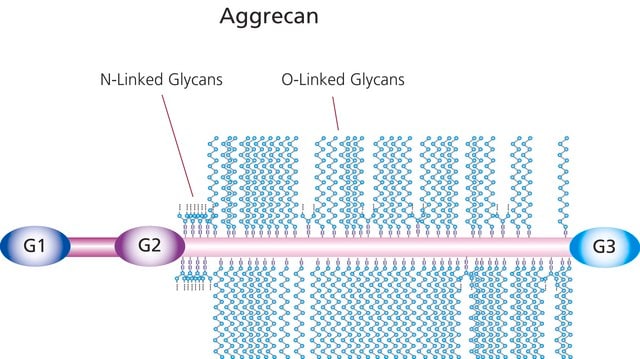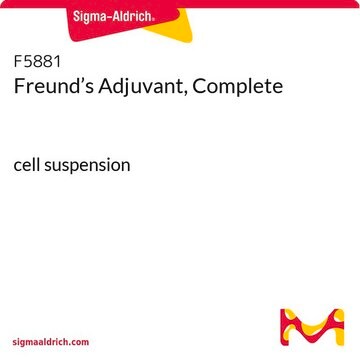Alle Fotos(1)
Wichtige Dokumente
B8041
Biglycan from bovine articular cartilage
essentially salt-free, lyophilized powder
Anmeldenzur Ansicht organisationsspezifischer und vertraglich vereinbarter Preise
Alle Fotos(1)
About This Item
Empfohlene Produkte
Biologische Quelle
bovine articular cartilage
Qualitätsniveau
Form
essentially salt-free, lyophilized powder
Mol-Gew.
200-350 kDa
Verpackung
glass bottle of 0.5 mg
Methode(n)
cell culture | mammalian: suitable
Löslichkeit
water: soluble ≥2.00 mg/mL, clear, colorless
UniProt-Hinterlegungsnummer
Versandbedingung
dry ice
Lagertemp.
−20°C
Angaben zum Gen
cow ... BGN(280733)
Allgemeine Beschreibung
proteoglycan consisting of a 45 kDa core protein and two chrondroitin/dermatan sulfate glycosaminoglycan chains
Biochem./physiol. Wirkung
Biglycan interacts with collagen type I and II, fibronectin and TGF-ß. In a low ionic strength (less than 3 mM phosphate) buffer, Biglycan binds more strongly to collagen type I. At higher ionic strengths, Biglycan will instead increase the inhibition effect of TGF-ß on osteoclast proliferation at a concentration of 4-20 mg/mL. It also functions to prevent the attachment of CHO cells to fibronectin, with a 50% inhibition at 17-21 mg/mL. As an extracellular component, Biglycan binds TGF-β 1, facilitates bone mineralization and supports osteoblast differentiation thru BMP-4 binding.
Komponenten
Biglycan is a 200-350 kDa proteoglycan consisting of a 45 kDa core protein and two chondroitin/dermatan sulfate glycosaminoglycan chains.
Vorsicht
Store this product at -20°C. Stored as supplied, this powder shows little decomposition in 3 years when stored properly.
Angaben zur Herstellung
This product is extracted from articular cartilage, chematographically purified, dialyzed against water, and 0.2 μm filtered prior to lyophilization. Once lyophilized, this powder is essentially salt-free. The product is soluble in water at 2 mg/mL.
Lagerklassenschlüssel
11 - Combustible Solids
WGK
WGK 3
Flammpunkt (°F)
Not applicable
Flammpunkt (°C)
Not applicable
Persönliche Schutzausrüstung
Eyeshields, Gloves, type N95 (US)
Hier finden Sie alle aktuellen Versionen:
Besitzen Sie dieses Produkt bereits?
In der Dokumentenbibliothek finden Sie die Dokumentation zu den Produkten, die Sie kürzlich erworben haben.
Kunden haben sich ebenfalls angesehen
G Pogány et al.
Archives of biochemistry and biophysics, 313(1), 102-111 (1994-08-15)
Binding of proteoglycans to type I collagen in vitro was assessed using radiolabeled decorin, biglycan, and large proteoglycans and acid-extracted bovine tendon collagen. Decorin, biglycan, and large proteoglycans were all bound to collagen fibrils in phosphate-buffered saline (PBS) containing 3
P J Roughley et al.
Matrix biology : journal of the International Society for Matrix Biology, 14(1), 51-59 (1994-01-01)
In chondrocytes isolated directly from human articular cartilage, without subsequent culture, biglycan mRNA levels decreased with the age of the donor, whereas those for decorin increased. In cultured chondrocytes in the presence of FCS, mRNA levels for biglycan remained similar
Mauricio Moreno et al.
The EMBO journal, 24(7), 1397-1405 (2005-03-19)
The BMP4 signaling pathway plays key roles during early embryonic development and for maintenance of adult homeostasis. In the extracellular space, BMP4 activity is regulated by a group of interacting molecules including the BMP antagonist Chordin, the metalloproteinase Tolloid and
E Schönherr et al.
The Journal of biological chemistry, 270(6), 2776-2783 (1995-02-10)
The small proteoglycan decorin is known to interact with type I collagen fibrils, thereby influencing the kinetics of fibril formation and the distance between adjacent collagen fibrils. The structurally related proteoglycan biglycan has been proposed not to bind to fibrillar
Filipe Pinto et al.
Cancers, 13(6) (2021-04-04)
Biglycan (BGN gene), an extracellular proteoglycan, has been described to be associated with cancer aggressiveness. The purpose of this study was to clarify the clinical value of biglycan as a biomarker in multiple independent GC cohorts and determine the in
Unser Team von Wissenschaftlern verfügt über Erfahrung in allen Forschungsbereichen einschließlich Life Science, Materialwissenschaften, chemischer Synthese, Chromatographie, Analytik und vielen mehr..
Setzen Sie sich mit dem technischen Dienst in Verbindung.









